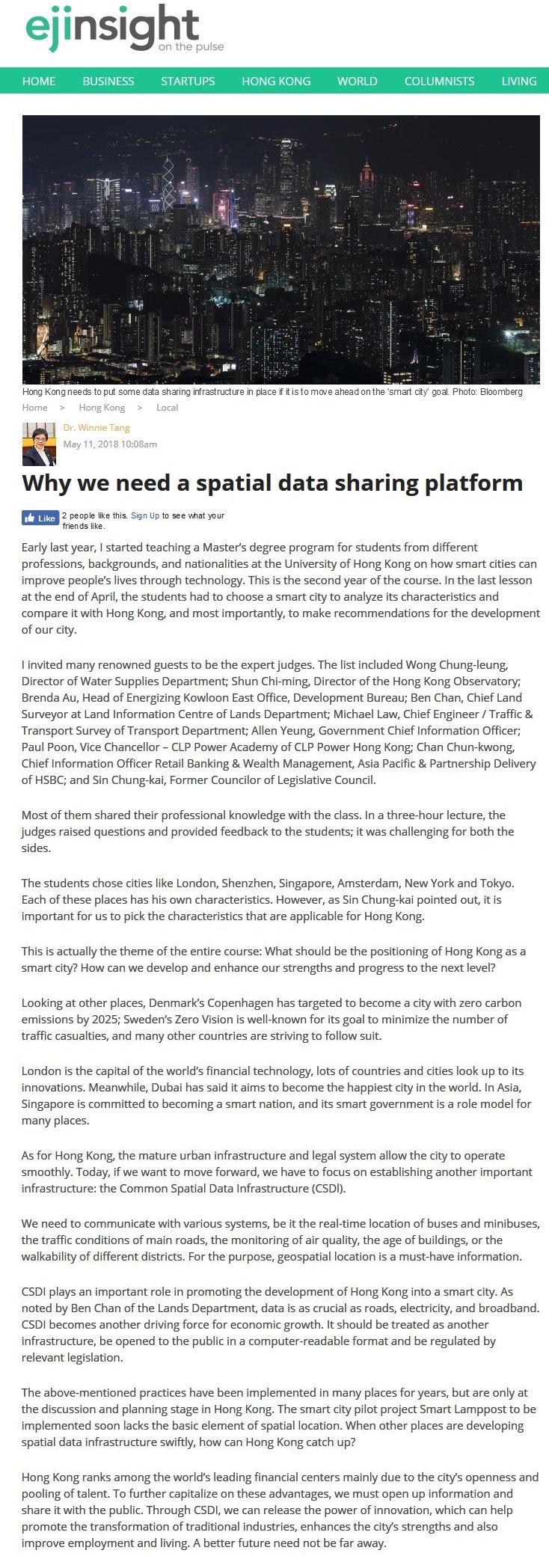網上版請按此

Why we need a spatial data sharing platform
Early last year, I started teaching a Master's degree program for students from different professions, backgrounds, and nationalities at the University of Hong Kong on how smart cities can improve people's lives through technology. This is the second year of the course. In the last lesson at the end of April, the students had to choose a smart city to analyze its characteristics and compare it with Hong Kong, and most importantly, to make recommendations for the development of our city.
I invited many renowned guests to be the expert judges. The list included Wong Chung-leung, Director of Water Supplies Department; Shun Chi-ming, Director of the Hong Kong Observatory; Brenda Au, Head of Energizing Kowloon East Office, Development Bureau; Ben Chan, Chief Land Surveyor at Land Information Centre of Lands Department; Michael Law, Chief Engineer / Traffic & Transport Survey of Transport Department; Allen Yeung, Government Chief Information Officer; Paul Poon, Vice Chancellor – CLP Power Academy of CLP Power Hong Kong; Chan Chun-kwong, Chief Information Officer Retail Banking & Wealth Management, Asia Pacific & Partnership Delivery of HSBC; and Sin Chung-kai, Former Councilor of Legislative Council.
Most of them shared their professional knowledge with the class. In a three-hour lecture, the judges raised questions and provided feedback to the students; it was challenging for both the sides.
The students chose cities like London, Shenzhen, Singapore, Amsterdam, New York and Tokyo. Each of these places has his own characteristics. However, as Sin Chung-kai pointed out, it is important for us to pick the characteristics that are applicable for Hong Kong.
This is actually the theme of the entire course: What should be the positioning of Hong Kong as a smart city? How can we develop and enhance our strengths and progress to the next level?
Looking at other places, Denmark's Copenhagen has targeted to become a city with zero carbon emissions by 2025; Sweden's Zero Vision is well-known for its goal to minimize the number of traffic casualties, and many other countries are striving to follow suit.
London is the capital of the world's financial technology, lots of countries and cities look up to its innovations. Meanwhile, Dubai has said it aims to become the happiest city in the world. In Asia, Singapore is committed to becoming a smart nation, and its smart government is a role model for many places.
As for Hong Kong, the mature urban infrastructure and legal system allow the city to operate smoothly. Today, if we want to move forward, we have to focus on establishing another important infrastructure: the Common Spatial Data Infrastructure (CSDl).
We need to communicate with various systems, be it the real-time location of buses and minibuses, the traffic conditions of main roads, the monitoring of air quality, the age of buildings, or the walkability of different districts. For the purpose, geospatial location is a must-have information.
CSDI plays an important role in promoting the development of Hong Kong into a smart city. As noted by Ben Chan of the Lands Department, data is as crucial as roads, electricity, and broadband. CSDI becomes another driving force for economic growth. It should be treated as another infrastructure, be opened to the public in a computer-readable format and be regulated by relevant legislation.
The above-mentioned practices have been implemented in many places for years, but are only at the discussion and planning stage in Hong Kong. The smart city pilot project Smart Lamppost to be implemented soon lacks the basic element of spatial location. When other places are developing spatial data infrastructure swiftly, how can Hong Kong catch up?
Hong Kong ranks among the world's leading financial centers mainly due to the city's openness and pooling of talent. To further capitalize on these advantages, we must open up information and share it with the public. Through CSDI, we can release the power of innovation, which can help promote the transformation of traditional industries, enhances the city's strengths and also improve employment and living. A better future need not be far away.
Dr. Winnie Tang
Honorary Professor, Department of Computer Science, The University of Hong Kong